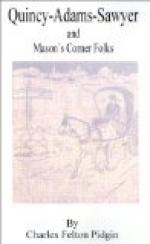Aunt Ella laughed heartily; then she said, “What a constitutional liar that Stiles must be, and as for the Professor, I would like to have a set-to with him myself.”
As she said this she doubled up her fists.
“Oh, he wouldn’t meet you that way,” said Quincy. “He only fights with a woman’s weapon, his tongue;” and he told her of his little boxing match with Robert Wood.
Aunt Ella continued: “I can imagine what a pretty, sweet, little country girl Huldy Mason is. My heart aches for Lindy, her martyrdom has been out of all proportion to her contemplated wrongdoing, if wrongdoing it really was. Had I been in her place I would have married Jones and left my clothes behind; and then,” said Aunt Ella, “how my heart goes out to that dear, sweet girl that you call Alice! Do you love her, Quincy?”
“Devotedly,” answered Quincy, “I never really loved a woman before.”
“Then marry her,” cried Aunt Ella decidedly.
“Everybody at home but Maude will object,” said Quincy.
“Maude’s the best one in the family, next to yourself,” snapped Aunt Ella.
“They will bring up Uncle Jim,” continued Quincy.
“Nonsense!” replied Aunt Ella. “Uncle Jim was a fool; any man is a fool who thinks he can win the battle of life by making a sot of himself. Bring this girl to me, Quincy. She must be a genius, if she can write as you say she can. Let me care for her and love her and make life pleasant and beautiful for her until you get ready to do it yourself.”
“I will, some day, Aunt Ella. You are the best friend I have in the world, and when I have the right to bring Alice to you, I will lose no time in doing so. Thank you for your kind words about her. I shall never forget them, and she shall hear them some day. But I must go now.”
They both arose, “Promise that you will come and see me every time you are in Boston, Quincy; if you don’t, I shall come down to Eastborough to see you.”
She gave him another kiss at parting.
As he left the house he deliberated for a moment as to where he should go next. It was half-past four. He decided to go to Leopold’s lodgings in Chestnut Street. He found him at home, but for a wonder he was not working.
“This is an off day with me,” he explained; “this is our haying season, and I’ve been working nights, days, and Sundays for a fortnight.”
“I came to express Miss Pettengill’s obligations and thanks for your kind and very successful efforts in her behalf.”
“Oh! that’s all right,” said Leopold. “By the way, have you told her she ought to write a book?”
“Not yet,” said Quincy; “but I’m going to soon. She has just lost a dear friend; but I won’t forget it.”
“Don’t!” repeated Leopold. “She is a diamond that ought to be dug up, cut, and set in eighteen carat gold. Excuse my apparently brutal language, but you get my meaning.”




